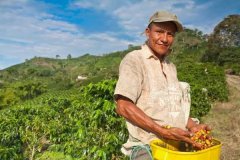A brief introduction to the steps of hand-washing method in the flavor producing area of Nicaraguan coffee beans
Nicaraguan boutique coffee beans
Nicaragua is one of the poorest countries in Central America. Due to its poor economic foundation, the coffee industry is still relatively backward, while coffee farmers are in extreme poverty. Fortunately, Nicaraguan coffee has received some foreign aid funds to improve the quality of its coffee.
Chocolate, caramel sweetness, almond flavor is obvious, sour taste is bright, different from the Central American tradition of bright acidity rising tone. The coffee planting ecology of Nicaragua has a unique environment, which is full of fertile volcanic soil and shaded planting methods, which has established a good growth physique, which makes Nicaraguan beans not only rich in mellow but also fragrant.
Although Nicaragua is a country with a large territory in Central America, it is not a big producer in the coffee world, and its output and reputation are much weaker than that of its neighbor Costa Rica. But the high-quality Nicaraguan coffee ranks first among the coffee beans in the world and enjoys a good reputation.
Traditional Nicaraguan coffee farmers are used to using water washing method for subsequent processing of coffee fruits. Coffee farmers are more accustomed to using water washing to ensure that the flavor of raw coffee beans is more stable and clean. it was not until about 2009 that the traditional concept of coffee farmers changed and began to try processing methods such as full sun and honey in more areas.
Lemon Tree Manor also processes coffee in a honey-treated way. After the coffee fruit is actually picked, the coffee with its exocarp removed is put on the African shed to dry. Compared with the traditional way of placing coffee directly on the ground to dry coffee, using African shed to dry coffee can reduce more pollution in the drying process, avoid producing more miscellaneous smell, and finally improve the quality of coffee. Honey-treated coffee beans have more attractive tropical fruit flavor.

Important Notice :
前街咖啡 FrontStreet Coffee has moved to new addredd:
FrontStreet Coffee Address: 315,Donghua East Road,GuangZhou
Tel:020 38364473
- Prev

What does the classification of Ethiopian coffee mean by washing and tanning G1?
Ethiopian coffee beans are divided into five levels. The first and second stages are washed beans. Washed beans Grade1 represents 3 defective beans per 300g raw beans, and Grade2 represents 4 defective beans per 300g. Gradc1 grade water washed beans are very rare and are generally difficult to buy. At present, all the washed beans exported from Ethiopia are Grade2 grade. The quality of sun-dried beans is Grade3 and Grade4 in order.
- Next

Grinding scale of Brazilian Yellow bourbon Coffee beans A brief introduction to the production area of Baking degree
A brief introduction to the Grinding scale of Brazilian Yellow bourbon Coffee beans Coffee was first introduced to Brazil in the early 18th century. In 1727, the Brazilian government sent a personable army officer to secretly bring coffee seeds from French Gaiana to Brazil on the pretext of mediating border disputes. it is said that the wife of French Gaiana was so fascinated by the officer that he saw him off on the evening of farewell.
Related
- Detailed explanation of Jadeite planting Land in Panamanian Jadeite Manor introduction to the grading system of Jadeite competitive bidding, Red bid, Green bid and Rose Summer
- Story of Coffee planting in Brenka region of Costa Rica Stonehenge Manor anaerobic heavy honey treatment of flavor mouth
- What's on the barrel of Blue Mountain Coffee beans?
- Can American coffee also pull flowers? How to use hot American style to pull out a good-looking pattern?
- Can you make a cold extract with coffee beans? What is the right proportion for cold-extracted coffee formula?
- Indonesian PWN Gold Mandrine Coffee Origin Features Flavor How to Chong? Mandolin coffee is American.
- A brief introduction to the flavor characteristics of Brazilian yellow bourbon coffee beans
- What is the effect of different water quality on the flavor of cold-extracted coffee? What kind of water is best for brewing coffee?
- Why do you think of Rose Summer whenever you mention Panamanian coffee?
- Introduction to the characteristics of authentic blue mountain coffee bean producing areas? What is the CIB Coffee Authority in Jamaica?

